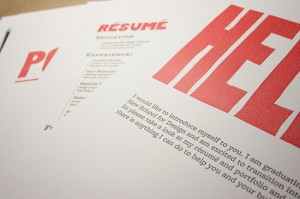 Considering there are more of us out of work now than there perhaps ever has been before, it’s always a good idea to keep your CV up to scratch. But potential employers of today don’t just expect a CV that’s neat, tidy and up-to-date, they expect a CV that’s going to really make their eyes pop. They are undoubtedly trawling through hundreds of CV’s, all of which might look the same, read the same and run home the same boring points in the same boring way. By making your CV stand out in both quality and style and by making it more accurately reflect you both as a person and as an employee you’ll be seen as a far more attractive candidate.
Considering there are more of us out of work now than there perhaps ever has been before, it’s always a good idea to keep your CV up to scratch. But potential employers of today don’t just expect a CV that’s neat, tidy and up-to-date, they expect a CV that’s going to really make their eyes pop. They are undoubtedly trawling through hundreds of CV’s, all of which might look the same, read the same and run home the same boring points in the same boring way. By making your CV stand out in both quality and style and by making it more accurately reflect you both as a person and as an employee you’ll be seen as a far more attractive candidate.
Here we’ll take you through a few easy tweaks that could be done in mere minutes and will really help your CV stand out from the pack.
Don’t miss out important information
You’d be astonished how many people neglect to include the most basic information on their CV’s. Make sure that you include not only your contact information (mobile, land line and email) but your full address and any social media profiles (especially LinkedIn) that might prove relevant.
Get rid of superfluous, irrelevant information
You might have run the London marathon 5 years ago and play saxophone in a local covers band but does that information really matter in a professional context? Probably not, unless of course you’re applying for a job in the charity sector or as a music teacher of course. Many CV’s are stuffed full of pointless piffle that has absolutely no bearing on the job what-so-ever. Although a CV should be more than simply a list of your qualifications and previous jobs and it is important to get your personality across, it also really shouldn’t read like an online dating profile.
Readability
This should be a no-brainer really but it’s surprising just how many people can’t be bothered to go that extra mile when it comes to making their CV’s a pleasure to read. From the arrangement of the page to the spelling and grammar, right down to the font (yes it does matter), go over your CV with a fine tooth comb and change anything that makes it more difficult to read in one swift movement. Bullet points always go down well as they really help break up the tedium a little bit and tables can also keep readers focused but try not to go overboard. Also, avoid any colour other than black like the plague, what might seem ‘quirky’ in theory will come across as unprofessional in practice. Same goes for the font. Nobody ever employed anyone who used ‘comic sans’ on their resume.
Keywords
Many CV’s in this great digital age will be stored and sorted through electronically and these CV’s will be sorted through by programs that scan for potential key words that are relevant to the job at hand. If you’re going for a job in a specific sector, chances are you already have an idea what some of these words will be so make sure to include as many of them as possible without it coming across as contrived.
Don’t worry about keeping it to one page
The majority of CV’s are read digitally now, so whether or not everything is on one page doesn’t matter half as much as it would have 10 years ago. Of course this doesn’t mean you should waffle on indefinitely about how “that summer in Vietnam totally changed your life”, but it also means you need not fret about somebody passing over your application simply because they can’t digest all the information in 10 seconds or less.
Keep it malleable
Make sure that your CV is structured in such a way that it can act almost as a basic template, which can be added to or subtracted from depending on the specific job you’re applying for. Make sure that you don’t end up sending the wrong CV to the wrong employer though.
Don’t be afraid to ask for help
Before you hit print or send, get a close (reliable) friend or family member to read it over. If they have any words of criticism, take them seriously. These people should know you well enough that they wouldn’t lie to you just to spare your feelings. Don’t be afraid to make changes either. If you manage to get through to the second stage of one interviewing process and are given feedback on your CV, listen, absorb it and don’t be afraid to use it!
Crispin writes for De Poel – Experts in non-permanent staffing solutions.


